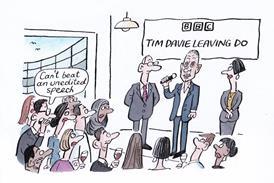Carrie Gracie’s stand shows correction hasn’t come soon enough

Not much of happy new year for the BBC, then. Even a shambolic cabinet reshuffle (I wonder if Channel 4 could take inspiration from several cabinet members and simply refuse to move?) couldn’t quite overshadow Carrie Gracie’s decision to quit her role as China editor.
The BBC is convinced that its gender pay gap is far less pronounced than that of many other major organisations, and that its 9% disparity will come to be seen in a better light as more companies publish their data.
This may well be the case. But there is a difference between the pan-BBC averages for gender pay, which are impacted by the percentage of women holding the most senior roles, and specific examples of clear pay gaps between men and women for doing the same job – or as near as damn it.
Gracie falls into the latter category. The BBC has not been able to explain why the China editor earned £135,000 if the North America editor made up to £250,000 and the Middle East editor up to £199,000.
Of course, there is nuance to all salaries, based on experience and skills, but the gap is too great, given Gracie’s impeccable credentials. It is plain wrong.
This is why the NUJ’s collective grievance on behalf of 121 female staff is so problematic for the BBC. It has been trimming staff salaries at senior levels for many years, but needs to act quickly now and accept that rises for some women will simply be essential.
“The sooner the BBC can get on the front foot and demonstrate where and how it has rectified inequality, the better”
At the RTS Cambridge Convention last year, I asked BBC chair Sir David Clementi how the corporation intended to tackle pay inequality: did it intend to pay women more, or men less? He said that establishing the principle of equal pay for exactly equal jobs was quite hard, but far from impossible, across the BBC’s 20,000 staff.
“It’s not a question of aspiration, it’s the law,” Clementi said.
He suggested that once an audit was complete, any like-for-like gaps that had been identifi ed needed to be “corrected immediately”.
That correction clearly hasn’t come immediately enough for Gracie. By going public and turning down a £50,000 pay rise, her point about the need for change could not be any clearer.
She has lost faith in her bosses and feels the issue has only come to a head because the BBC was forced to reveal presenter salaries.
The sooner the BBC can get on the front foot and demonstrate where and how it has rectified inequality, the better – because in the meantime, reputational damage is being done.

Chris Curtis is the editor of Broadcast





























No comments yet